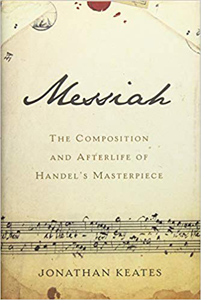 Jonathan Keates, Messiah: The Composition and Afterlife of Handel's Masterpiece (New York: Basic, 2017), 165pp.
Jonathan Keates, Messiah: The Composition and Afterlife of Handel's Masterpiece (New York: Basic, 2017), 165pp.
Just before Christmas in 2015, my sister sent me a newspaper clipping about Galion, Ohio, the little town where I was born. Galion was celebrating its 60th Anniversary Presentation of Handel's Messiah. Just two months after I was born in 1955, my father challenged the new choir director of the city schools to perform the Messiah. He responded, "if you get 75 people there for the first night of rehearsal, we'll do it." And that's what my father did. On that first rainy November night, he kick-started a 60-year tradition. Their first performance of the Messiah in the high school auditorium had a chorus of 129 members.
One measure of the influence of Handel's Messiah is that this story about small town America is hardly an exception. Hundreds of choirs all over the country still perform Handel's masterpiece and give it what Jonathan Keates calls its "afterlife." Keates is well-known for his 400-page comprehensive biography of George Frideric Handel (1685–1759), Handel: The Man and His Music, so readers are in expert hands with this small volume about a single work by a prodigy who wrote forty operas.
Handel had been in London (he was a naturalized citizen) almost thirty years when he composed the Messiah in a "three week burst of creativity" that began on August 27, 1741. On September 12 he had completed a draft score, which, as he goes on to describe, was always a dynamic work in progress rather than a static or finished subject. When Handel left London for Dublin to perform the Messiah for the first time on April 13, 1742, for example, he had no idea what awaited him in terms of singers or instrumentalists. It was a year later, in March of 1743, that the work was first performed in London.
Keates concludes his book with the oratorio's specific origins and yet universal appeal: "Sincere and practicing Christians both, George Frideric Handel and Charles Jennens [the librettist] created Messiah for a Christian audience, yet it consistently manages to transcend the limits of religious and confessional dogma. Its emotional range, the ways in which it embraces the multiplicity of existence, the directness of its engagement with our longing, our fears, our sorrows, our ecstasy and exaltation, give the whole achievement an incomparable universality. Messiah knows who we are and speaks to us all."


